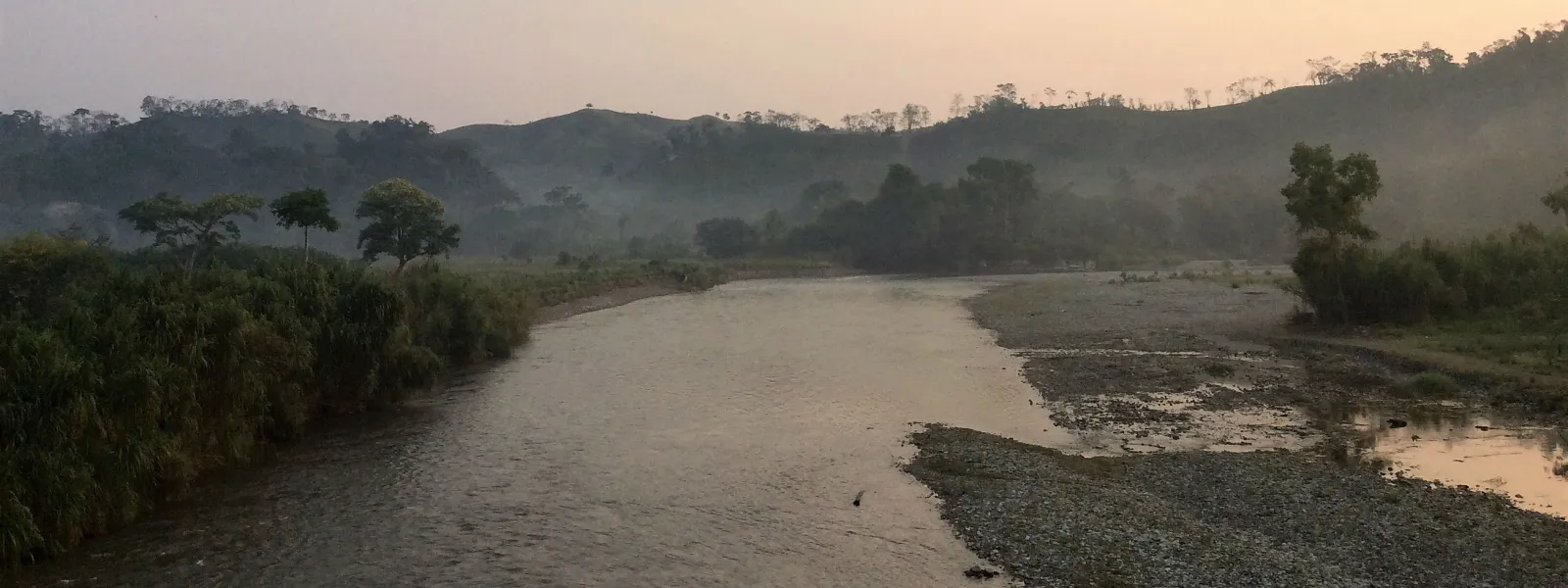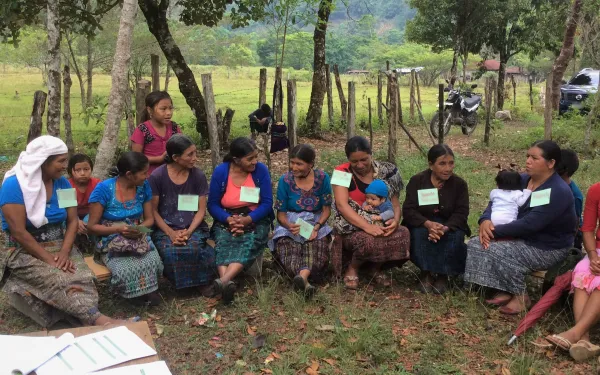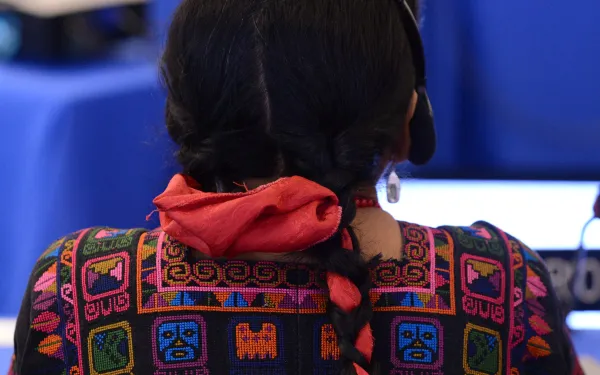
Project
Liliana Ávila /AIDAMayan women’s struggle before the Inter-American Development Bank in Guatemala
Mayan communities succeeded in getting the IDB Invest to develop a responsible exit plan after withdrawing its financing for two hydroelectric projects that negatively impacted ecosystems and the livelihoods of indigenous peoples, especially women, in the micro-region of Yichk'isis (Ixquisis).
In the struggle to defend their water, territory and way of life, indigenous Mayan communities in the Yichk'isis (Ixquisis) micro-region of northern Guatemala convinced the Inter-American Development Bank Group to withdraw its financing of two hydroelectric dams whose implementation violated their rights. The decision was also significant in that the IDB, for the first time, designed a responsible exit plan.
That historic advance was the result of the complaint that the communities filed in August 2018—with the support of AIDA, the Plurinational Ancestral Government of the Akateko, Chuj, and Q'anjob'al Native Nations, and the International Platform against Impunity. The complaint was filed with the Independent Consultation and Investigation Mechanism (MICI), the IDB Group's accountability office.
In resolving the case in September 2021, the MICI concluded that IDB Invest failed to comply with its own operational policies and safeguards, in the framework of the financing granted to the company Energía y Renovación S.A. for the implementation of the San Mateo and San Andrés hydroelectric projects.
Learn more about this achievement
In the mountains of Northwestern Guatemala, near the border with Mexico, the land is rich and fertile. Several important rivers and many other water sources feed the soil.
The residents of these mountains, many indigenous women of Mayan descent, have long depended on the waters to nourish them, to provide them with fish, as well as for agriculture, sanitation, and cooking.
But the construction of the San Mateo and San Andres dams has caused water scarcity and the contamination of rivers and other natural resources long cherished by the communities.
The near lack of water has also drastically reduced harvests, lessening the income gained from selling corn, wheat, beans, coffee, sugar cane and other products in the market. As a result, the conditions of poverty in the area have deepened.
And the risk situation is profound, particularly for women, who have played a very important role in the defense of water and territory threatened by hydroelectric projects, and are therefore victims of intimidation and stigmatization.
As guardians of their land and water, they have come to its defense and they’ll continue to prevent environmental deterioration from further harming their families.
Read our fact sheet on the case

Related projects
Latest News

The women defending Guatemala’s rivers from large dams
When Maria gets up each morning, the first thing she does is open the tap in her house to see if there’s any water. If there is, she prepares coffee and, within a few hours, food for her family. Her house is alive with plants and animals. Dogs, cats and chickens surround her as she lights the wood stove, carrying her young son on her back. Maria lives in Ixquisis, a region of northwestern Guatemala near the Mexican border, in the department of Huehuetenango. There, water springs from the earth and large rivers like the Pojom and the Negro flow through the mountains. For Maria, the river is a special place. There, she meets with other women and washes clothes, a traditional activity for women in her community, most of whom are indigenous. Each afternoon, as the water flows steadily downstream, they talk about their families, their to-do lists, their joys and their worries. Last month, Maria joined with the other women of Ixquisis to speak about the threats the dams pose to their way of life. They were part of a workshop AIDA organized in collaboration with Protection International and the International Platform Against Impunity. Maria’s life has changed a lot since they started building the Pojom II and San Andrés dams, and she’s been losing sleep. Before the construction of the dams began, Maria used to fish. By submerging a basket in the river, she gathered—as if by magic—snails, shrimp and small fish. These are riches the river no longer provides. Instead, the once pristine river has become filled with garbage, rubble and other debris. The workers use its water to wash cars and machinery. “One day we will run out of water and we won’t be able to live,” Maria said, echoing the primary fear of the women of Ixquisis. “Our children will suffer.” Their fear is well founded. Many families like Maria’s already suffer from stomach and skin diseases that they associate with water pollution. Before the workshop, the women of Ixquisis hadn’t had the opportunity to speak publicly about the importance of water and the rivers in their lives. They hadn’t been able to explain how their rivers had changed since the dams’ construction began. They had also never been provided with information about the projects. But even without knowing the details of the dams, Maria and her neighbors understood that the water in their homes no longer arrived as cleanly or as regularly as before. Time and again, they have peacefully expressed their opposition to the dams. But their voices have been stigmatized and shaken by fear of reprisal. Before Maria walked calmly through her community, even at night. She now leaves the house in fear. But the people of Ixquisis have the support of people and organizations that work to protect the environment and human rights. The international organization Front Line Defenders, for example, recently awarded them the 2018 Award for Human Rights Defenders at Risk. One day after the women’s workshop, we organized a second meeting attended by the men of the region. The lack of water has affected their main subsistence activity: the cultivation of bananas, cardamom, vegetables and other products they take to market. Because their harvests have decreased, they must now work more hours to obtain the same profit. I learned a lot from Maria. Her strength, as well as that of all the residents of Ixquisis, comes from her respect for nature and all it offers them. I share that feeling and channel it into my work as an AIDA attorney, legally advising the men and women of Ixquisis on how to defend their territory. I work so that water will continue to flow from their taps, and so that they can one day walk again without fear, in search of a healthier future for their children.
Read more
Attacks against Guatemalan human rights defenders denounced
Communities and organizations appealed to the Inter-American Commission on Human Rights, urging the State of Guatemala, private businesses, and investors to guarantee the human rights of people and communities affected by large hydroelectric projects. They presented a report, outlining 10 different cases, which documents 273 incidents of threats, criminalization, and attacks against defenders, traditional authorities, journalists, and communities. Criminalization included 103 arrest warrants, imprisonment of 36 defenders, and the murder of 11. Washington, DC, United States. A coalition of communities and organizations denounced human rights violations against traditional and indigenous communities in Guatemala, at a hearing before the Inter-American Commission on Human Rights. Because of their opposition to large hydroelectric projects, the human rights defenders have been threatened, assaulted, treated as criminals, and assassinated. A report presented before the Commission, featuring 10 different cases, notes that various communities confronting these projects have faced rights abuses including violations of their rights to free, prior, informed, and culturally appropriate consultation; self-determination; due process; and life. The report also outlines how those who defend affected people and communities have been victims of threats and aggressions. The most common attacks include arrest warrants (103), assaults resulting in injuries (56), imprisonment (36), detention (25), criminalization (16), and threats (15). There have been 11 documented murders and three conflict-related deaths in communities that oppose these hydroelectric projects. At least 19 companies are linked to hydroelectric projects in Guatemala, of which 55 percent are national, 40 percent are transnational, and five percent are State-owned. The complaints emphasized that it is the duty of the State to guarantee the rights of communities, and of the people who defend them. The obligation to respect human rights also extends to operating companies and project funders. Therefore, the organizations and communities ask the Guatemalan State to: Comprehensively respect the rights of indigenous people, including the rights to self-determination; consultation; and free, prior, informed, and culturally appropriate consent. Ensure the safety of human rights defenders. Include the participation of indigenous communities in the design and implementation of their energy-development policies. They also request the companies involved to: Comply with due diligence in matters of business and human rights. Refrain from taking actions, such as filing lawsuits, that result in criminalization of and attacks on human rights defenders. Publicly recognize the positive and fundamental role of human rights defenders in democracy. The complete report (in Spanish) is available here. Authors Include: Acompañamiento de Austria (ADA); Asamblea Departamental de Pueblos de Huehuetenango (ADH); Asociación de Abogados Mayas de Guatemala; Asociación Indígena Ch`Orti` Nuevo Día; Interamerican Association for Environmental Defense (AIDA); Business and Human Rights Resource Center; Consejo del Pueblo Maya (CPO) Consejo Mam; Guatemala Human Rights Commission, USA (GHRC); Guatemala Solidarity Network; Microregión de Ixquisis, San Mateo Ixtatán; The Swedish Fellowship of Reconciliation (SweFOR); PAYXAIL YAJAW KONOB (Gobierno Ancestral Plurinacional) AKATEKA, CHUJ, POPTI’, Q’ANJOB’AL; International Platform Against Impunity; Protection International; Proyecto Acompañamiento Quebec Guatemala Montréal, Canadá; Resistencia Río Dolores and Unidad de Protección a Defensoras y Defensores de Derechos Humanos (UDEFEGUA). Press contacts: Karen Hudlet, Business and Human Rights Resource Center, [email protected] Rodrigo da Costa Sales, Interamerican Association for Environmental Defense (AIDA), [email protected]
Read more